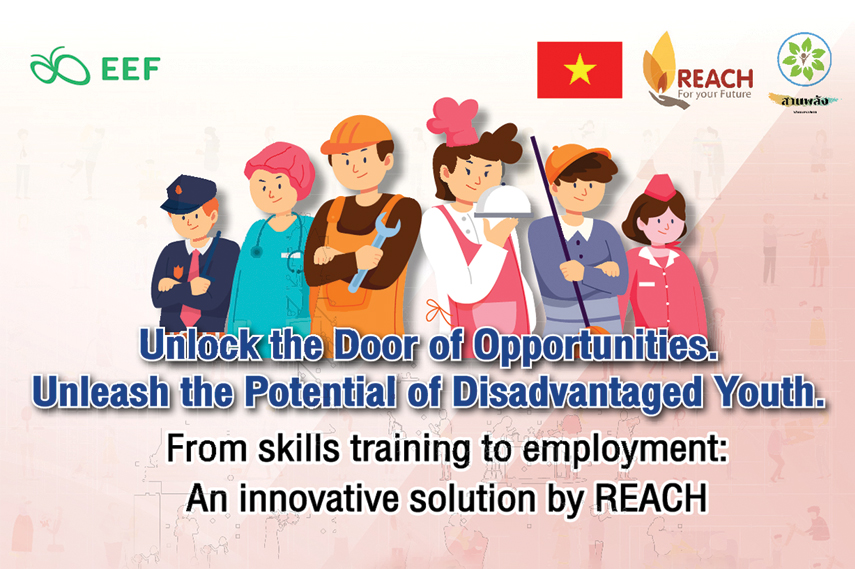
In his younger days, Quyet was too weak to pass the entrance exam. Although he was lucky enough to get a job in an electronic company, he soon had to quit because he was too frail for the labor work. Quyet was born with Osteogenesis imperfecta (OI), a genetic brittle bone disease. As a result, his bones fractured easily. His arms and legs broke often and he was not able to carry weights. Uneducated and jobless, poor Quyet might have ended up in the streets like many unfortunate youths who went before him. Not before a door of opportunity opened for him as he got a chance to attend a graphic design training course offered by REACH. Quyet now has gainful employment at Pixelz Company. His life has turned around. He has gained self-respect and confidence, can support himself and his family, and makes a positive contribution to the economy and society.
 Credit: REACH Vietnam https://www.reach-vietnam.org/
Credit: REACH Vietnam https://www.reach-vietnam.org/
REACHING OUT
Quyet’s life, in many ways, echoes a common theme. It serves as a singular piece in the broader mosaic of the most disadvantaged youth who missed out because of their physical, educational, and economic challenges, hindering their educational pursuits or leaving them uncertain about their career trajectories.
What REACH did is empower them to build a better future essentially by providing them with vocational training, life skills, and job opportunities. REACH supports 18-30 years old workforce especially those with limited access to formal education and training due to physical constraints and societal barriers caused by poverty and other challenging life circumstances.
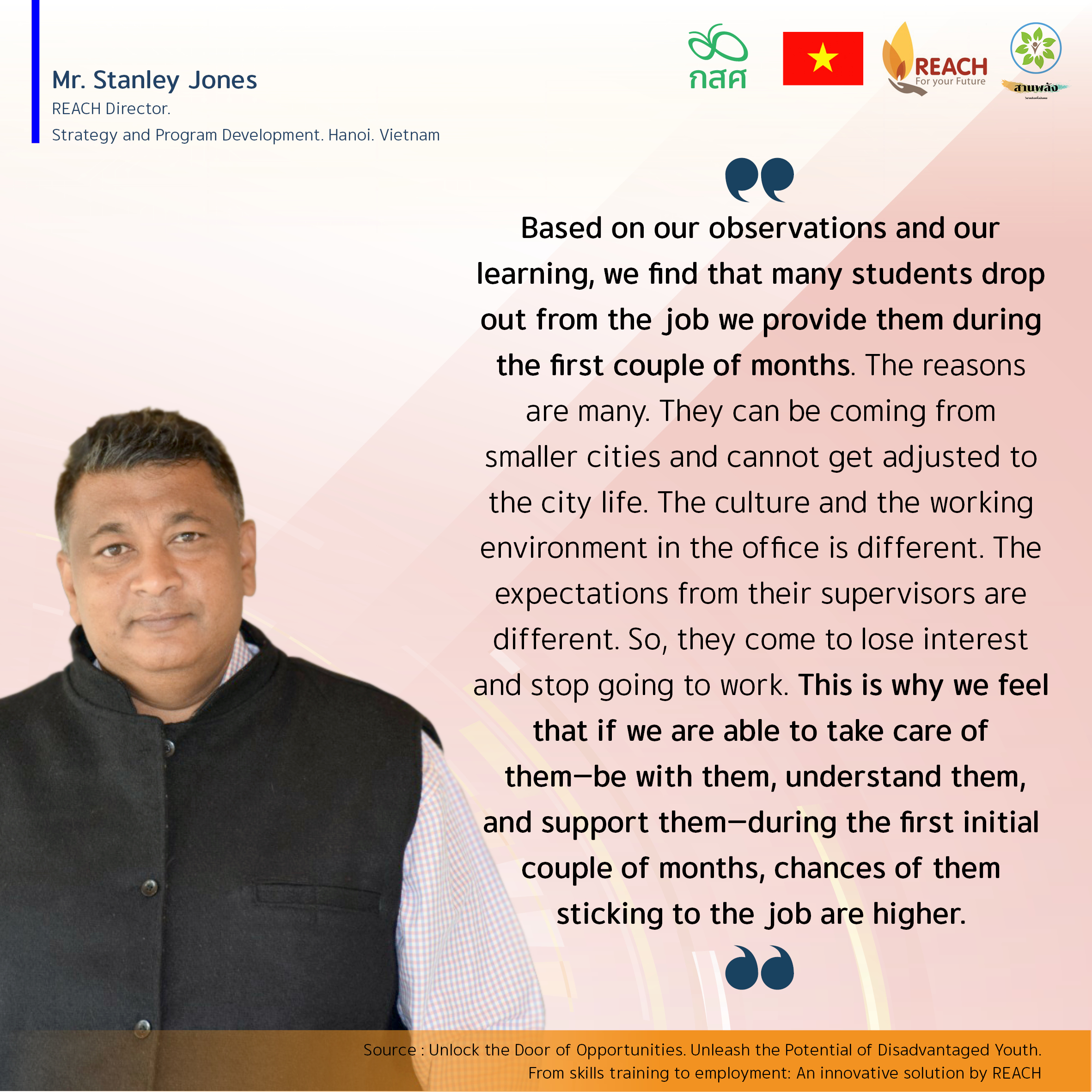
According to Stanley Jones, Director of Strategy and Program Development, who was the Guest Speaker in an online seminar titled “Unlocking the Door of Opportunities. Unleashing the Potential of Disadvantaged Youth.”, recently held by Equitable Education Fund, marginalized and vulnerable youth in Vietnam supported by REACH include survivors of domestic violence, disabled youth, visually impaired and hearing-impaired youth, ethnic minorities, the LGBT community, victims of trafficking, and migrants. Well aware that it is unlikely for them to come forward for help, the organization “reaches” out to these underrepresented groups.
To approach youth at risk, REACH would first identify “an outreach district” i.e. a place for mobilization. Then they would speak with community leaders, youth, and various community-based organizations to get a good grasp of the catchment area. Once readiness is assessed, appropriate tools for mobilization are designed based on the location. Setting up stalls in bustling places like local markets and bus stops makes it easier to engage vulnerable youths.
REACH takes great care in assessing a student’s needs, aspirations, interests, preferences, attitudes, and personalities, utilizing useful tools like the Holland Code and Pictorial Interest Inventory to determine an appropriate training course for individual students. The rigorous screening process will increase the likelihood of a student’s commitment throughout the training program and enhance their employability.

PREPARING THE RIGHT MAN FOR THE RIGHT JOB
To ensure that graduates have job-specific skills that meet the needs of the labor market, REACH works in collaboration with partner industries to provide short-term and intensive training programs that blend theoretical with practical knowledge. The training team comprises highly qualified, full-time trainers who develop curricula and work closely with industry coaches from partner companies.
In addition to technical expertise, students learn crucial 21st Century skills, i.e. teamwork, critical thinking, and creative problem-solving. They also acquire soft skills training encompassing fundamental entrepreneurial skills, green skills training, and practical sessions on CV writing and interviews.
REACH would go the extra mile to conduct mock interviews and collaborative sharing sessions with REACH’s business partners, followed by careful job placement. Afterward, regular post-employment monitoring for six to nine months will be carried out to ensure a smooth transition of disadvantaged youth into the workforce.
On the other hand, REACH performs market surveys to identify job roles sought by employers, develop a demand-driven curriculum, constantly update the curriculum based on findings, and validate it with industry partners. The meticulous steps taken are to make sure that students will be equipped with the necessary skills to meet particular job demands and secure their employment opportunities. Vocational courses that are in high demand and are popular among Vietnamese youth include graphics design, 3D modeling, sales & marketing, food & beverage, cooking, spa & wellness, and hairdressing.
Consequently, REACH has so far trained over 20,000 disadvantaged boys and girls and employed 10,426. With more than 1,068 companies as REACH partners committing to post-training employment, the organization successfully placed 80-85% of their graduates in decent jobs at the end of the training program.
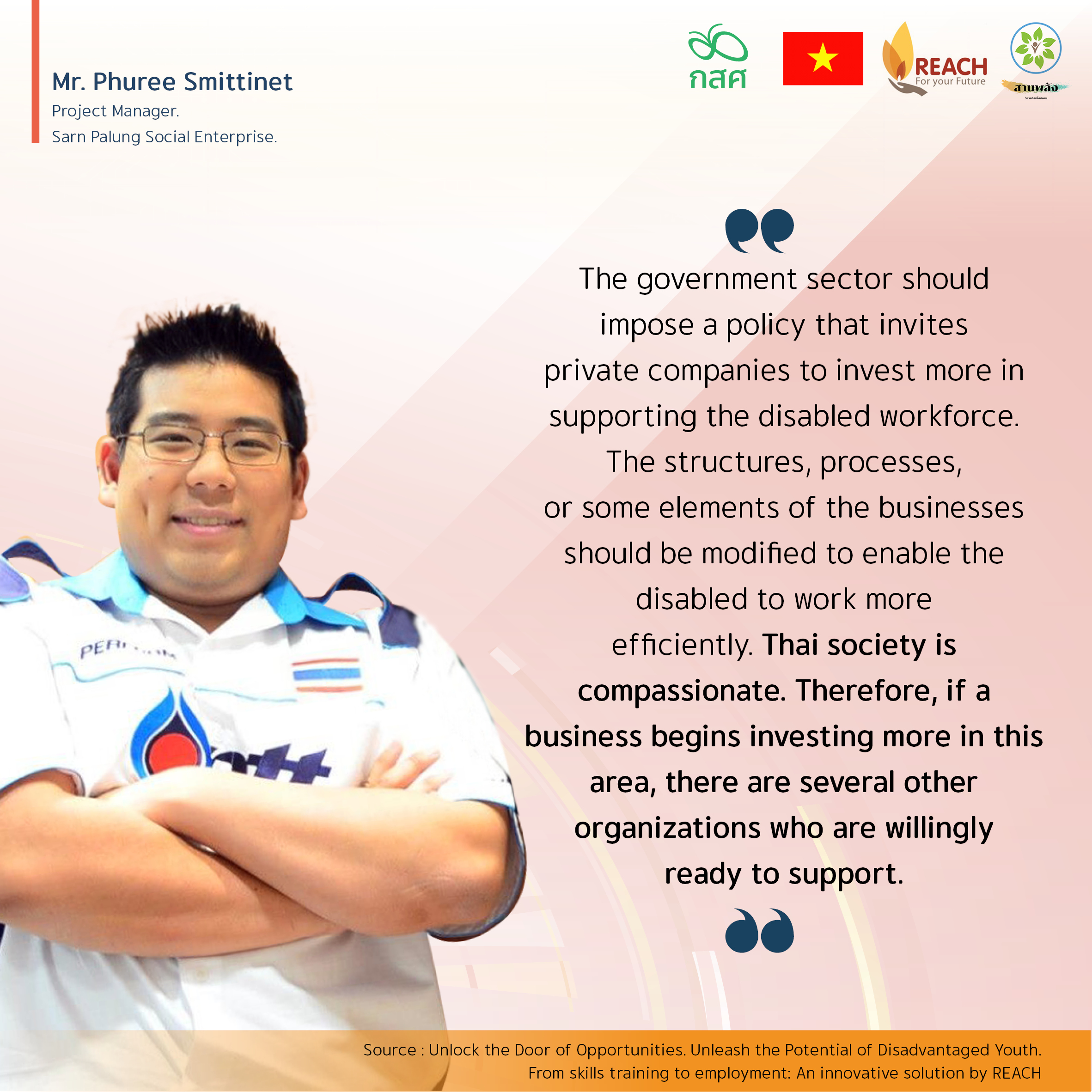
CREATING OPPORTUNITIES
Responding to a participant who shared his concern about prejudice against deaf persons in Thai society via a sign language interpreter, Jones acknowledged that in Vietnam many domestic companies also harbor reservations about hiring persons with disabilities. Misgivings regarding their physical and mental capacities, as well as concerns about their ability to integrate into the workforce, only serve to marginalize them and hinder their opportunities for employment and livelihood. Both management and regular workers need to have a positive attitude toward new employees with disabilities. Orientations and other measures aimed at fostering a supportive and understanding environment in the workplace are among the priorities for promoting an inclusive and equitable workplace culture.
“Among persons with disabilities, those with hearing impairments rank second in terms of number but last in terms of employment,” remarked Phuree Smittinet, leader of Sarn Palung, a PPT Group’s social enterprise flagship, during his presentation on the same occasion.
Following the late King Bhumibol’s royal advice, Mr. Phuree initiated Café Amazon for Chance, to train and employ persons with hearing impairments to work as baristas with Café Amazon, a coffeehouse chain under the PTT umbrella. The business objective is for the coffee shops to generate sustainable income and employment for persons with hearing challenges. The principle is straightforward but the execution is not so. The foremost challenge is, understandably, communication between regular staff, deaf baristas, and customers.
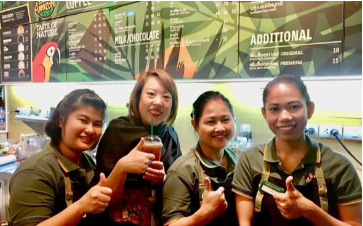
Credit: Presentation from Phuree Smittinet, leader of Sarn Palung during Unlocking the Door of Opportunities: Unleashing the Potential of Disadvantaged Youth Webinar
Café Amazon for Chance devised a solution called “Train the Trainers,” involving the introduction of sign language instructors to educate regular staff on how to communicate with hearing-impaired employees. Once they have mastered the sign language, they can effectively provide on-the-job training to the recruits with hearing loss. The initiative extends to collaboration with Ratchasuda College, where their instructors acquire skills in coffee making from Café Amazon. Subsequently, these instructors can impart their newly acquired knowledge to the hearing-impaired students. Given that the coffee business involves specific terminology beyond the current Thai sign language repertoire, such as “cappuccino” and “macchiato”, Café Amazon for Chance specifically developed new TSL vocabulary to train these staff.
Great effort was put into making sure that customers and deaf baristas could understand each other. Some of the special features of these cafes include dual-screen POS systems to decrease the instances of incorrect orders and digital coffee grinders to ensure consistency in every cup of coffee. There are instructions for customers to learn how to order in basic sign language as well as “Deaf Barista” badges and signages to inform unaware customers of the service they will receive and to promote greater empathy for the deaf employees.
Presently Café Amazon operates 287 branches in Thailand, Cambodia, and Vietnam, with 50 branches hiring 400 persons with hearing disabilities. As government and private agencies have increasingly shown interest in adopting the model, more and more employment opportunities will be opened up for persons with disabilities.
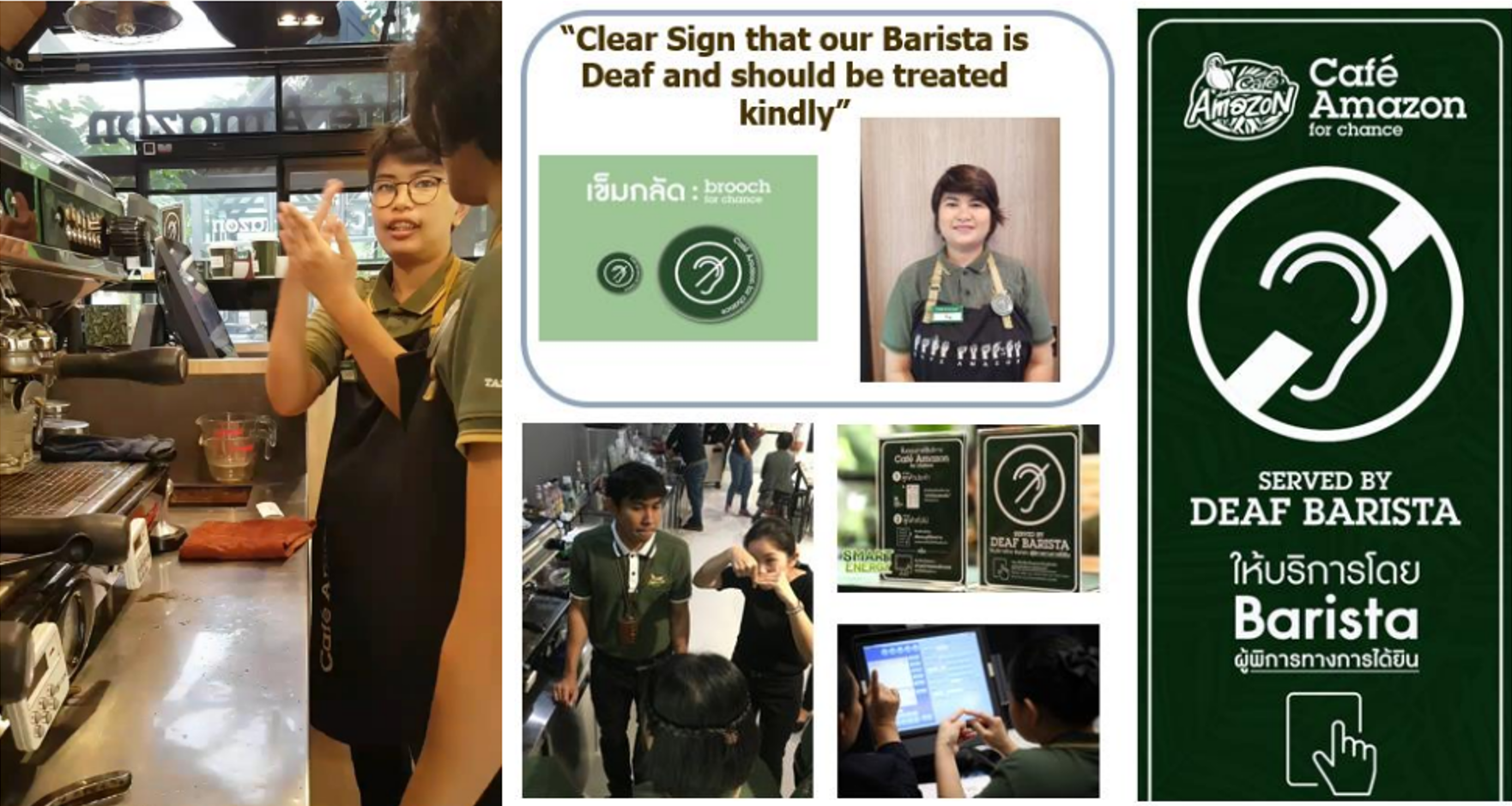
Credit: Presentation from Phuree Smittinet, leader of Sarn Palung during Unlocking the Door of Opportunities: Unleashing the Potential of Disadvantaged Youth Webinar
Vocational and life skills training provided by organizations like REACH and Café Amazon for Chance has helped disabled youth overcome adversity. The stories of Quyet and the hearing-impaired baristas attested to the innovative endeavors by both organizations to unleash the potential of disadvantaged youth on one hand while demonstrating the determination and hard work of the youth themselves on the other. They affirm that disadvantaged youth can earn a living, live better lives, and contribute positively to society if the door of opportunity is open for them.
______________________________________
About EEF International Forums:
EEF International Forums serve as a platform for sharing knowledge, experience, views, and innovations related to education and vocational training for disadvantaged children and youths. Since its inception in 2019, the project has successfully organized on-site and online seminars, featuring speakers from various countries. The online events are broadcast via Zoom and Facebook Live, with seminar videos available for later viewing on Facebook and YouTube. For more information about the Equitable Education Fund and the EEF International Forums, please visit the EEF International Forums
Source:
Event Record – https://fb.watch/pvvZSDmiif/

